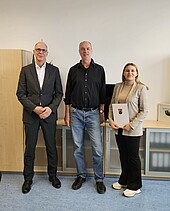Since the beginning of April 2024, Dr. Noëlle Behringer has joined the team at the Department of Social and Health Care as Professor of Social Work in the Context of Mental Health Crises. Noëlle Behringer, born in 1992, studied Social Work in Bachelor and Master at the Protestant University of Applied Sciences Darmstadt, supplemented by a Master's degree in Psychology at DIPLOMA University. After completing her doctorate at the Faculty of Special Education at Ludwigsburg University of Applied Sciences in 2021, the child and adolescent psychotherapist with a background in depth psychology initially took on a deputy professorship for childhood education at Darmstadt Protestant University of Applied Sciences and worked as an advanced researcher at the Zurich University of Applied Sciences for Curative Education. Before starting in Ludwigshafen, Noëlle Behringer held a professorship for Social Work at the Baden-Württemberg Cooperative State University Villingen-Schwenningen.
Here, Prof. Dr. Noëlle Behringer introduces herself in more detail:
What tasks does your new position involve?
As a professor at HWG LU, I am primarily involved in education, research and self-administration. In education, I cover various topics relating to the discipline and profession of social work at its intersection with psychology and social pedagogy. I currently offer courses on the topics of theories and casuistry of social work, methods of social work, (critical) developmental psychology, consequences of the institutionalization of social work and theories of everyday life and the subject and, together with Prof. Dr. Karen Wagels, lead the focus area "Social work in the context of psychological crises". in research, I am primarily active in the international network MentEd - Mentalization-based Pedagogy and lead a research project on biographical self-reflection as an occasion for professionalization.
What appeals to you most about the new position?
What appeals to me most about the new position is the attempt to combine perspectives of critical social work with psychological perspectives and to make them fruitful for socio-educational and socio-psychiatric fields of work. I am also particularly pleased with the openness to psychodynamic perspectives of my colleagues in the Social Work department.
What did you do professionally before you took up your post in Ludwigshafen?
Before I accepted the position at the HWG LU, I was a professor of social work at the Baden-Württemberg Cooperative State University Villingen-Schwenningen. There, I mainly covered health science and psychological topics in my education. I also worked at the Protestant University of Applied Sciences Darmstadt as a substitute professor for childhood education and at the HfH Zurich as an advanced researcher at the Institute for Behavioral, Socio-Emotional and Psychomotor Development.
Do you also have practical experience?
Yes, I still work as a supervisor in a mother-child day clinic. I also have practical experience in school and out-of-school child and youth welfare as well as in inpatient, day-care and outpatient psychiatric and psychotherapeutic care for children and adolescents.
Why did you choose the HWG LU?
The social work degree programs at the HWG LU are strongly oriented towards critical social work by the colleagues in the team, which asks about the interweaving of subject and structure and, in my view, focuses on the question of social and socio-political conditions (including power and domination) that are genuinely relevant to social work. This perspective is no longer a matter of course at many universities in Germany due to increasing economization tendencies in social work, but it is very important to me. At the HWG LU, my denomination allows me to combine precisely these perspectives with concepts and theories of psychoanalytical social work - all of which contributed to my decision to come to the HWG LU.
Thank you very much!
(Questions: Dr. Elena Wassmann, University Communication)

